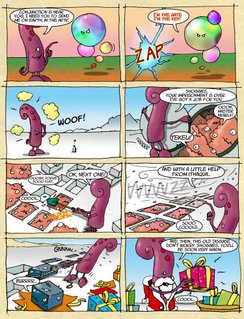
http://www.macguff.fr/goomi/unspeakable/vault00-cast.html
http://www.macguff.fr/goomi/unspeakable/vault148.html
Internet is a wondrous tool and I use it, (ain't I a fool?)for you dear pupils, who wish to speak the Queen's English. Well, maybe not but at least, if asked whether you speak English or not, don't say: "I do not!"
HOW TO CALL THE POLICE WHEN YOU ' RE OLD AND DONT MOVE FAST ANYMORE.
George Phillips of Meridian, Mississippi was going up to bed when his wife told him that he'd left the light on in the garden shed, which she could see from the bedroom window.
George opened the back door to go turn off the light but saw that there were people in the shed stealing things.
He phoned the police, who asked "Is someone in your house?" and he said "no". Then they said that all patrols were busy, and that he should simply lock his door and an officer would be along when available.
George said, "Okay," hung up, counted to 30, and phoned the police again.
"Hello, I just called you a few seconds ago because there were people in my shed. Well, you don't have to worry about them now cause I've just shot them all." Then he hung up.
Within five minutes three police cars, an Armed Response unit, and an ambulance showed up at the Phillips' residence and caught the burglars red-handed.
One of the Policemen said to George: "I thought you said that you'd shot them!"
George said, "I thought you said there was nobody available!"
.
Taken from another blog: (thxs Delancey :-)
http://delanceyplace.blogspot.com/
for more on Truman Capote:http://www.ansoniadesign.com/capote/
In this excerpt, little seven-year-old Truman Capote, abandoned by his parents and raised by dirt-poor relatives in Alabama, is closest friends with his distant cousin, an elderly, simple-minded, and slightly crippled woman named Sook. On a cold and empty Christmas afternoon she exclaims to him:
" 'My, how foolish I am!' she cries, suddenly alert, like a woman remembering too late she has biscuits in the oven.
'You know what I've always thought?' she asks in a tone of discovery, and not smiling at me but a point beyond. 'I've always thought a body would have to be sick and dying before they saw the Lord. And I imagined that when He came it would be like looking at the Baptist window: pretty as colored glass with the sun shining through, such a shine you don't know it's getting dark. And it's been a comfort: to think of that shine takes away all the spooky feeling.
But I'll wager it never happens. I'll wager at the very end a body realizes the Lord has already shown Himself. That things as they are,'--her hand circles in a gesture that gathers clouds and kites and grass and Queenie, our dog, pawing earth over her bone-- 'just what they've always seen, was seeing Him. As for me, I could leave the world with today in my eyes.' "
Truman Capote, A Christmas Memory, Modern Library, 1996, originally published in 1956, pp. 26-7.
1) EXPRESSION ORALE
Je peux décrire qui je suis, où je suis né, ce que je fais et où j'habite.
Je sais donner l'heure
Je peux parler en phrases très simples de gens et de lieux.
Je sais compter, indiquer des quantités et donner l'heure.
Je peux donner de façon suivie quelques informations sur moi-même (nom, prénom, âge, etc.)
Je reconnais des consignes claires et simples.
Je comprends des expressions familières et simples de la vie quotidienne (acceptation,
refus, remerciements, etc.)
Je comprends quand on me salue, quand on me demande comment je vais ou quand
on me dit au revoir.
Je peux comprendre le sujet d'une histoire courte ou d'un dialogue simple.
Je peux comprendre des questions sur l'endroit où j'habite, sur ce que je fais, sur les gens que je connais.
Je peux comprendre un message simple qui m'est adressé, par exemple sur une carte postale.
Je comprends les messages figurant sur les panneaux indicateurs.
Je peux comprendre suffisamment un questionnaire (à l'arrivée à un hôtel par exemple) pour y indiquer mon nom, prénom, date de naissance, nationalité).
Je reconnais des mots connus ou des internationalismes dans un texte écrit.
Je peux essayer de deviner le contenu d'un texte en m'aidant des illustrations.
Je peux essayer de deviner le sens des mots que je ne connais pas en m'aidant de leur ressemblance avec ma langue ou avec une autre langue que je connais.
Je peux reproduire sans erreur des mots, des expressions, des phrases courtes et simples déjà connues à l'oral et des consignes simples.
Je peux copier des consignes simples.
Je peux écrire des phrases simples sur moi-même ou des personnages, décrivant où ils habitent et ce qu'ils font.
Je peux écrire une carte postale simple.
Je peux écrire des phrases simples sur moi-même ou des personnages, décrivant où ils habitent et ce qu'ils font.
Je peux remplir des formulaires me concernant, par exemple à la reception d'un hôtel.
Je peux faire des achats quand il est possible de compléter par des gestes ce que je dis.